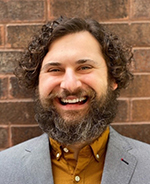You Can’t Fix What You Can’t Measure — A Roadmap to Sustainable Progress
Craig Arnold teaches MSES students the value of lifecycle assessments in their sustainability toolkit.
Craig Arnold, a sustainability consultant with TASA Analytics, is on a mission to create change agents who know how to help corporate America curb its impact on the environment.
As a Trienens Institute Fellow with Northwestern's Master of Science in Energy and Sustainability (MSES) program, he got access to the next generation of energy and sustainability leaders. MSES is jointly offered by Northwestern Engineering and the Paula M. Trienens Institute for Sustainability and Energy.
 Arnold teaches about business applications of lifecycle assessments (LCA), taking a two-step approach to outlining its significance to business operations for Northwestern students.
Arnold teaches about business applications of lifecycle assessments (LCA), taking a two-step approach to outlining its significance to business operations for Northwestern students.
The foundation of an LCA is an overall review of company procedures to quantify how a particular piece – or its entire operation – affects sustainability. The foundation of an LCA is an overall review of a system to quantify its sustainability performance. A system could be a product, a service, or even an entire company’s operations.
“It’s really important early on in a lifecycle assessment to understand the hotspots,” he said. “Where are the biggest impacts in terms of the product line or the manufacturing process or the materials used in products? Where are businesses really impacting the environment the most?”
Once students have that strong foundation, Arnold’s instruction switches to teaching how to use the results to continue the journey through incremental improvements.
“We discuss how to make decisions based on a lifecycle assessment and also how to communicate results within an organization to get buy-in from stakeholders,” he said. “The first half of the class is very technical; whereas the second half is more about taking the next step by actually taking action.”
Arnold has been doing that for more than a decade.
He spent eight-plus years as a senior environmental design engineer at Apple, where he developed LCA models for key manufacturing processes. He collaborated with different product design teams to focus on minimizing environmental impact and also contributed to corporate sustainability initiatives across the organization.
Arnold left Apple in 2021 to become a carbon expert at Watershed, an enterprise sustainability platform that helps companies measure, report, and reduce their environmental impact.
In his current role with TASA Analytics, Arnold provides LCA research for a variety of Fortune 500 companies. His assessments help these organizations understand and then reduce their environmental impact.
Because of the time involved with building corporate sustainability efforts, Arnold refers to it as a journey – more of a marathon than a sprint. An LCA can be a key part of that journey, and the industry needs more people to espouse the benefits.
That’s where his role with MSES comes in. Arnold’s goal is to move sustainability discussions from ambiguous qualitative talk to concrete quantitative steps companies can take to improve sustainability practices.
“At first glance, this might be kind of a squishy thing, but a lifecycle assessment really helps quantify things and put numbers behind sustainability efforts,” he said. “A lot of people who care about the environment are not receptive to squishy pitches. They need numbers.”
Arnold, who has been with the MSES program since January, said he likes what he sees from MSES students so far. They understand the importance of quantifying the value of sustainability, he said.
“The students are incredibly bright,” he said. “There's this additional level of passion about sustainability topics that you get from MSES students because that's what they're there for.”